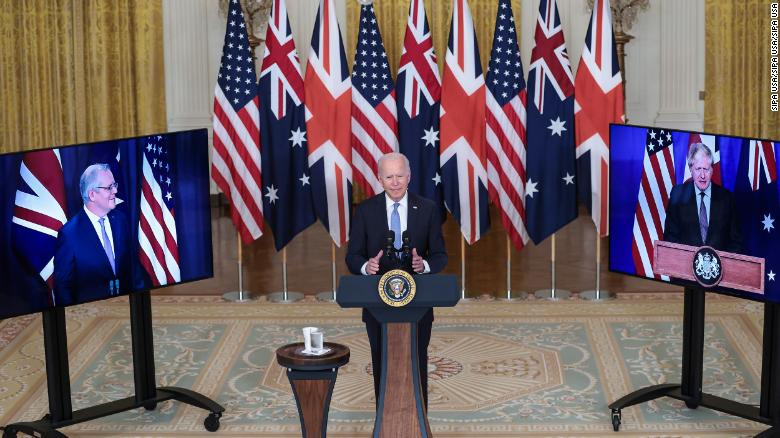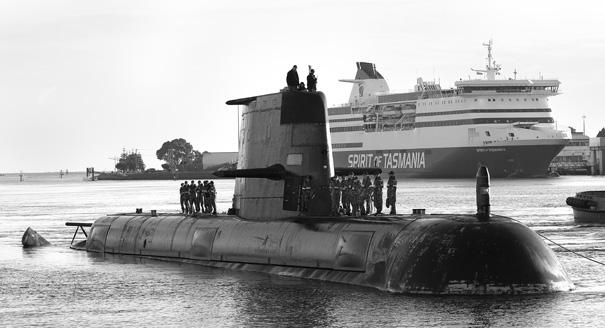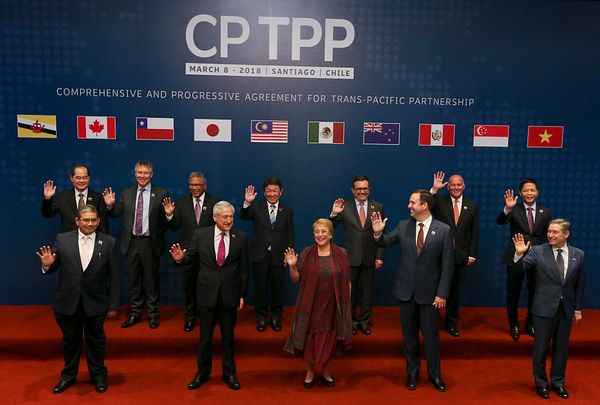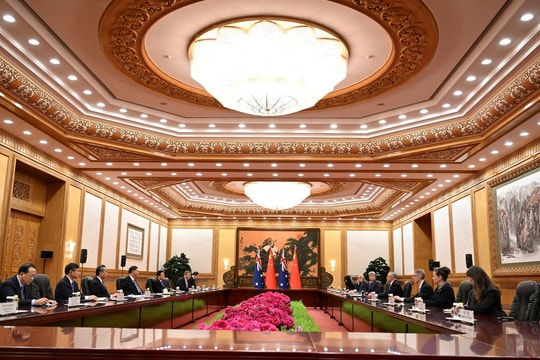Should Russia worry about the AUKUS alliance?
(Baonghean.vn) - The decisions made by NATO may not be very pleasant for Moscow, but in general, they are consistent and predictable. Meanwhile, this comment is not true when talking about structures such as AUKUS.
 |
| US President Joe Biden speaks about the AUKUS security initiative on September 15 at the White House. Photo: CNN |
The formation of a new military and political alliance of the United States, Australia and the United Kingdom (AUKUS) and the resulting collapse of France's "contract of the century" to build a new generation of diesel-powered submarines for Australia have caused mixed reactions in Russia.
Some are pleased to see the conflict between the US and France, while others worry that the alliance is as much about Moscow as it is about Beijing. Others worry about the implications of the US decision to share nuclear submarine technology with a non-nuclear state (instead of French diesel submarines, Canberra will now have eight nuclear submarines).
These are all valid points, but they all focus on the short-term consequences of AUKUS’s formation. But the decision to form a tripartite alliance and a new form of modernising Australia’s submarine fleet has long-term implications too, including for Russia.
More than anything, the creation of AUKUS confirms that the standoff with China is clearly the number one foreign policy priority for US President Joe Biden and his administration. Defending against China is clearly worth the risk of a serious rift with Paris, the embarrassment it places on Canberra, and the broadening of its interpretation of nuclear non-proliferation. The reality is that Washington is increasingly unlikely to be able to compete with Beijing alone in the naval arena, especially in the eastern Pacific, so it has no choice but to rely on its most trusted partners, while ignoring the inevitable costs.
Nuclear-powered submarines have one undeniable advantage over modern diesel submarines: greater range, thanks to their superior autonomy. If the new submarines are intended solely for Australia’s defense, they need not be nuclear. However, if they are expected to operate covertly for months at a time in more distant waters – say, in the Taiwan Strait, near the Korean Peninsula, or somewhere in the Arabian Sea – then a nuclear reactor would be a significant advantage.
 |
| Illustration: Getty |
For Russia, this means that any actions it takes from now on will be viewed by Washington in the context of the US-China confrontation. For example, the White House will turn a blind eye to Moscow’s cooperation with countries like India in the field of military technology, seeing it as a way to improve its regional balance with Beijing. On the other hand, Russia’s ongoing support for China’s naval modernization program will be closely scrutinized and could become a reason for the US to impose new sanctions on both countries.
There are some speculations that, over time, AUKUS will become an Asian alliance equivalent to NATO, with more countries joining, such as Canada, New Zealand, Japan, South Korea, India, etc. These predictions of course raise concerns in Russia.
However, they are unlikely to come true. Countries like South Korea and India have no desire to join a multilateral military alliance that could damage their relations with other countries. In any case, the very creation of a new structure is an implicit admission by Washington that the rigid alliance model of the 20th century is not suitable for this century. If anything, AUKUS is an attempt to find a modern alternative to NATO.
Certainly, NATO’s role in US strategy will be diminished, but that is not necessarily in Russia’s long-term interest if it means it will be replaced by structures such as AUKUS. NATO has clearly defined procedures and decision-making mechanisms for reaching compromise among its broad membership. NATO’s decisions may be unpleasant for Moscow, but they are generally consistent and predictable. The same cannot be said of “lightweight” structures such as AUKUS, where improvisational responses are possible, which inevitably increases political risks.
The AUKUS concept predicts that control of sea lanes will continue to be a priority for the United States. The United States is not in a position to establish sufficient control over land transport corridors in Eurasia, nor does it need to: the main global transport routes of goods in the near future will be maritime. For this reason, not the Eurasian continent, but the world’s oceans will become the main “battlefield” between the United States and China.
For Russia, a primarily land power, that’s generally fine—as long as Moscow doesn’t try to position itself at the center of a Sino-American standoff. Theoretically, in the next few decades, Australian submarines could appear off Russia’s Sakhalin Island and Kamchatka Peninsula, or even pass through the Bering Strait into the Arctic Ocean, posing a potential new threat to Russia’s Northern Fleet. But there are reasons to assume that their main routes will lie further south, and will not directly impact Russian interests.
 |
| China has also just submitted an application to join the TPP. Photo: Diplomat |
It is noteworthy that around the time of the establishment of AUKUS, China also applied to join the Comprehensive and Progressive Agreement for Trans-Pacific Partnership (CPTPP). CPTPP was actually conceived as part of a strategy to contain China's economy under former US President Barack Obama, but his successor Donald Trump refused to join this initiative. China's chances of joining CPTPP are very slim, as by making the request, Beijing once again showed that, for its part, it wants to limit its competition with Washington to the scope of trade, investment and technology. On the other hand, by creating AUKUS, the US and its partners are increasingly signaling that the scheme is expanding the confrontation into the field of military technology and the geopolitical arena.
When Germany, Austria-Hungary, and Italy agreed in May 1882 to form a military and political bloc called the Triple Alliance, few in Europe anticipated the long-term consequences. After all, the alliance’s purpose was purely to contain France, whose revanchist policies had run rampant following its defeat in the Franco-Prussian War of 1870-72. There was no further planning in Berlin, Vienna, or Rome. But just over 30 years later, Europe was engulfed in the blood of an unprecedented war.
Today, AUKUS seems like a hastily cobbled together, rickety, unstable structure. But in 20 or 30 years, the logic that led its members to form a new military and political alliance could lead them into a situation from which neither they nor their adversaries can exit without the most serious consequences for themselves and the rest of the world. That is the main long-term danger from AUKUS.


